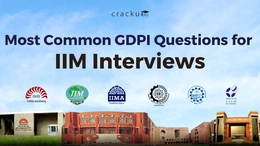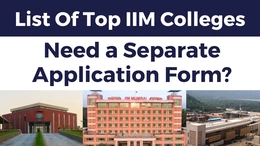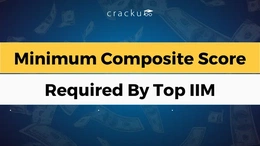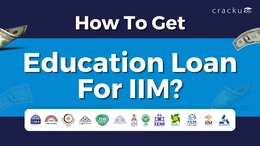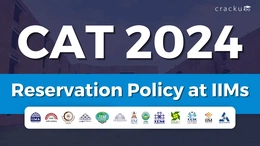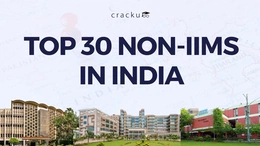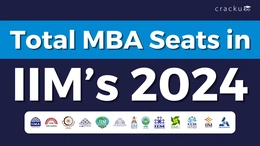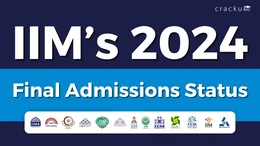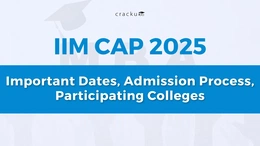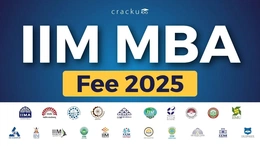IIM Interview Questions 2025
IIM Interview Questions 2025: IIMs are the crème de la crème of management institutes in India. Lakhs of aspirants apply for these courses every year, and passing the CAT exam is one big challenge. But it is equally challenging in the final admission round-the personal interview. For freshers, it may be more haunting as they have no work experience. But that doesn't mean they cannot shine at it. With the right preparation and an understanding of what interviewers typically ask, freshers needn't feel nervous about this stage.
Here is a detailed look into the most common IIM interview questions for freshers, along with insights on how to approach them.
Also Read, Most Common GDPI Questions for IIM Interviews, Check Now
IIM Interview Questions For Freshers
1. Tell me about yourself.
This is the classic ice-breaker question. It's usually the first in every interview and will therefore establish the tone for the rest of the conversation. The response will let the interviewer know about your personality, background, and how well you can provide a summary of important things about yourself in concise ways.
How to Answer the Question?:
Give an introduction by giving out your name, hometown, and educational background
Accentuate academic achievements and your involvement in extracurricular activities.
Any internship, project, or volunteer work.
Brief and to the point with no personal detail of your family or personal life.
Sample Answer:
"Good morning, I am ******, graduate in Economics from Christ University, Bangalore. I have earned a 3.3 GPA in the undergraduate program and also organized economics fests for my college. In my final year, I worked on a project related to macroeconomic trends in developing countries. That was something that got me very interested in management. Apart from academics, I love playing basketball and have represented my college in many inter-college tournaments."
2. Why MBA and why now?
For freshers, especially those who have just graduated and do not have any work experience, this is an imperative question. The interviewer wants to know why you need an MBA and how it fits in with your long-term goals for your career. Freshers must clearly express a convincing reason why they need to do an MBA immediately after graduation.
How to Answer?
Let your interviewer know your long-term career goals, and how an MBA will help you achieve these goals.
Why have you applied to pursue an MBA at this point in your career, rather than going straight to work and doing it later?
Specific skills you would like to acquire, such as leadership or strategic thinking or business acumen.
Sample Answer:
In the course of my undergraduate studies, I developed a deeper sense of interest in the strategic sides of business and how companies deal with economic challenges. An MBA will give me a good foundation in management concepts and provide me with the appropriate tools to lead teams. As a fresher, I would like to start early by getting structured management education which would accelerate my learning curve and prepare me for future leadership.
3. Why do you want to join this particular IIM?
This question analyses how much research you have done and how serious you are about joining that particular IIM college. Interviewers expect the candidates to know something about the institute's niche offerings, faculty, and culture.
How to Answer?
Do proper research on that particular IIM: go through its flagship programs, faculty, and campus culture.
Say how the strengths of the institute match your goals and interests.
This is instead to be avoided-like "because it's a prestigious institute." Be specific, not general.
Sample Answer:
What draws me to IIM Bangalore is its sharper entrepreneurship and innovation agenda. The courses at the NS Raghavan Centre for Entrepreneurial Learning (NSRCEL) support my long-term goal of starting my own venture. In addition, at IIM Bangalore, learning is cherished through peer groups as well as a diverse student population will allow me to learn from different angles-of-view which truly characterize the dynamic business environment today."
4. What are your strengths and weaknesses?
This question tests your self-awareness and sincerity level. You should be able to present a fair response mentioning your strengths and weaknesses and willingness to rectify the weaknesses.
How to Answer?:
Strengths: Show your relevant skills for an MBA courses, which can be leadership skills, communication skills, problem-solving skills or something else.
Weaknesses: Choose any area you think needs improvement but show what you're doing to overcome that weakness.
Avoid giving stock answers, such as "I am simply a perfectionist."
Sample Answer:
"My strength lies in remaining composed and cool in stressful situations. I got the experience by being the president of the economics club in college. I tend to organize big events, which has taught me how to multitask without losing focus. One of my weaknesses is overanalysis. I work on that by setting clear time limits for decision making and learning to be confident with the initial judgment."
5. Describe a situation where you faced an obstacle and what steps you took to deal with it.
Most often, the behavioral question asks you to explain how you behaved in a challenging situation. Being a fresher, you may not have corporate experiences to narrate. Therefore, you should speak of the challenge you encountered in academics, projects, internships, or other activities.
How to Answer?
Use the STAR model while answering (situation, task, action, and result).
Select a challenge that captures the most relevant skills: leadership, teamwork, or managing time.
Write about the actions taken to address the challenge and positive outcome.
Example Answer:
"It was my final year economics project wherein I led the team. At mid-term, one of the members left due to personal reasons, which gave us a lag in our timeline. I had to manage that extra workload while keeping the rest motivated. By reorganising the workload and taking more meetings to meet and deal with what's going on and what has yet to be done, we were able to cope up and complete the project within the given time, and our paper was well-received by the faculty as well."
6. What are your career objectives?
The question is trying to find out if you have some sort of career vision and where the MBA fits in. Freshers must have at least some amount of clarity, no matter how vague the objectives.
How to Answer?:
Be honest about long-term and short-term career goals
Correlate your goals to the skills/knowledge that you will gain from an MBA.
A description of how IIM's program will help in delivering these objectives.
Sample Answer:
I'd want to spend some time working in a consulting firm for a couple of years that would expose me to different industries while, at the same time, developing my problem-solving skills. Long-term goals include having a leadership role, probably in a strategic planning department, helping organizations take data-driven decisions. I believe that an MBA at IIM will give me the right equipment in terms of analytical tools and the right training to groom myself for these roles.
7. Can we have any questions from you?
You would often be asked at the end of an interview to ask some questions. This is your chance to show that you really are interested in the institute and clear your doubts.
How to Proceed?
Avoid questions based upon information easily available on the website.
Ask about the culture of the institute, or the scope of international exposure, or some specific electives.
Express interest in how the program could help you grow.
Sample Question:
"What are the experiential learning opportunities at IIM, including live projects or industry collaborations in which students can participate?"
Also Read, IIM Interview Experiences 2025: Help Others by Sharing Your Experience.
Other IIM Interview Questions
Other top questions asked in the Personal Interview round of MBA admissions are listed below. All of them are the most important questions to think about when preparing for a personal interview.
- Why do you want to specialize in marketing/ finance/HR?
- Tell us about your hobbies and interests
- Where do you see yourself in the next five years
- Tell us about your career goals
- Tell us about your Strengths and Weakness
- What do you think is your best achievement
- Who is your role model?
- Have you ever demonstrated leadership? Share the situation…
- Which other MBA colleges have shortlisted you for final selection? Which one do you propose to choose and why
- To whom you would give credit for your success and why?
- Is there anyone who inspires you? Share reasons.
- How would you differentiate between a good manager and a good leader?
- Which is your biggest challenge so far?
- What does Criticism mean to you? How do you deal with it
- How do you think you will contribute to the batch and the institute if we select you?
- What expectations do you have with this MBA program?
Also Read, IIM Shortlist 2025, Important Dates, Shortlisting Criteria
Graduation Wise IIM Interview Questions
1. Engineering
- Why do you want to pursue an MBA after engineering?
- How does your technical background align with a management role?
- Explain a project you worked on during your engineering studies and its practical applications.
- How would you use data analytics in solving business problems?
- What are the key skills you learned as an engineer that will help you in management?
- Can you explain a complex engineering concept in simple terms?
- How would you manage a team that includes both engineers and non-engineers?
- What is the relevance of AI in today’s business landscape?
- How can engineering principles be applied to business management?
- What is your opinion on the integration of AI in business processes?
2. Commerce
- What are the key differences between financial accounting and management accounting?
- How would you assess the financial health of a company?
- Explain the concept of working capital management and its importance in business.
- Why do you want to pursue an MBA after a commerce degree?
- What is the significance of corporate governance in modern businesses?
- Can you explain the impact of GST on Indian businesses?
- How would you handle a situation where a company’s cash flow is low despite profits?
- What are the key financial ratios you would analyze when evaluating a company?
- How do you see the role of a commerce graduate in driving business strategy?
- What are the latest trends in the Indian economy that are affecting businesses?
3. Economics
- What is the role of monetary policy in controlling inflation?
- How does fiscal policy affect economic growth?
- What are the major challenges faced by developing economies like India?
- Why do you want to pursue an MBA after studying economics?
- Can you explain the concept of demand-supply elasticity with a real-world example?
- How would you analyze the impact of a global recession on Indian businesses?
- What is the significance of international trade in economic development?
- How do macroeconomic factors influence business decisions?
- Can you explain the economic consequences of rising crude oil prices?
- How can economic theories be applied to solve business problems?
4. Humanities (Arts)
- How do you think your background in humanities will help you in an MBA program?
- Can you explain how cultural studies can inform management decisions?
- What are the key skills you have gained from your humanities education that are transferable to business?
- How would you use your knowledge of psychology/sociology in managing teams?
- What role do ethics play in business management, according to your studies?
- Why did you choose to shift from humanities to business management?
- How can social studies help in understanding market behavior?
- Can you discuss a current social issue and its impact on business?
- How would you handle diversity and inclusion in a corporate setting?
- How does studying history help in understanding modern business environments?
5. Science
- Why do you want to pursue an MBA after a science degree?
- How can your scientific approach be applied in business problem-solving?
- What are the most important transferable skills from your science background?
- How would you apply analytical thinking to a business challenge?
- Can you explain a scientific concept and its potential business application?
- How does the pharmaceutical industry benefit from scientific research?
- How would you handle a situation where business decisions conflict with scientific data?
- How can technology derived from scientific advancements improve business processes?
- What are the potential ethical issues in biotech/pharma companies, and how would you manage them?
- How can climate science impact business strategies?
6. Law
- How does your legal background complement your desire to pursue an MBA?
- What are the major differences between corporate law and business management?
- How would you use your legal expertise in handling business disputes?
- What is the importance of compliance in running a business?
- Can you explain a legal concept, like contract law, and its relevance in business operations?
- What is the significance of intellectual property rights for a growing company?
- How would you address ethical challenges in business from a legal perspective?
- What role does corporate governance play in the success of a business?
- Can you give an example where legal regulations impact business decisions?
- How would you approach negotiations as a lawyer in a business setting?
7. Medicine (MBBS)
- Why do you want to pursue an MBA after a medical degree?
- How can healthcare management benefit from your medical background?
- What are the major challenges in healthcare management today?
- How would you handle the business side of a hospital or healthcare facility?
- What is your opinion on the impact of healthcare policies on business?
- How would you manage a healthcare crisis from a business perspective?
- What is the significance of technology in improving healthcare services?
- How would you apply leadership skills learned in medicine to a business setting?
- Can you discuss a time when you worked in a team during your medical practice and how it relates to management?
- How would you approach cost management in a healthcare organization?
IIM Interview Questions 2025: Conclusion
You could be fresh to the IIM interview, but proper preparation can help you come out with confidence through it. You need to come out appearing self-aware, motivated, and capable of making the most out of an MBA program. Thus, anticipating common questions, preparing thoughtful, structured answers, and proceeding, you will be sure to leave the right impression in the minds of the interviewers and knock on the door closer to snagging a seat in one of India's best business schools.













